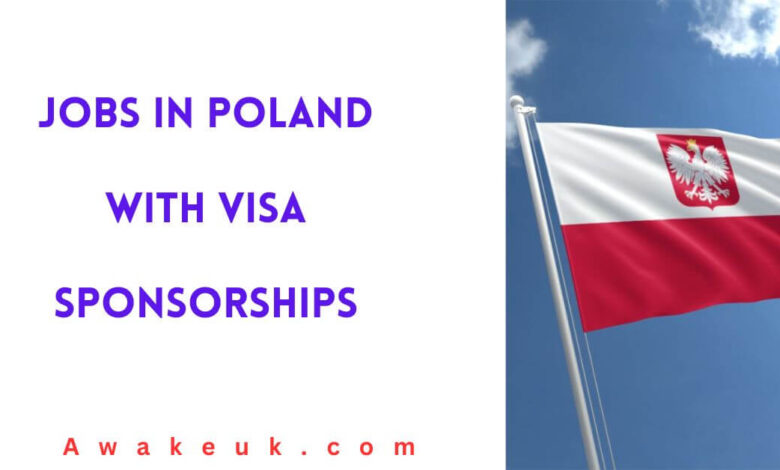Jobs in Poland with Visa Sponsorships 2024 – Apply Now

Central European Poland, renowned for its rich heritage and vibrant culture, is becoming an increasingly popular destination for foreign workers. Poland offers a plethora of opportunities for those seeking international employment due to its expanding economy, robust job market, and favorable living conditions.
Understanding the landscape of visa sponsorship jobs in Poland is essential if you are contemplating this option. This guide attempts to provide a comprehensive overview of these opportunities, the application process, and the advantages and disadvantages of pursuing such positions.
Understanding Visa Sponsorship Jobs
Employers who are willing to sponsor the necessary visa for a foreign worker to work legally in the United States are offering visa sponsorship positions as employment opportunities. Employers seeking to engage non-EU citizens in Poland must first obtain a work permit for the prospective employee. This permit functions as “sponsorship” and enables the worker to apply for a national visa (Type D) or a temporary residence permit, allowing them to legally reside and work in Poland.
Opportunities for Jobs in Poland with Visa Sponsorships:
In recent years, Poland has experienced substantial economic expansion and development. This development has created a plethora of employment opportunities in industries such as information technology (IT), engineering, finance, healthcare, and education.
Cities such as Warsaw, Krakow, Wroclaw, and Poznan are international business centers and therefore offer numerous visa sponsorship positions. Nonetheless, opportunities are not limited to urban centers. Silesia and Lesser Poland, regions renowned for their industrial and technological centers, also have a significant demand for foreign labor.
The Application Process Jobs in Poland with Visa Sponsorships:
The process of obtaining a visa sponsorship position in Poland entails multiple steps and requires the active participation of both the employer and the applicant.
For the Employer:
Application for a Work Permit: The prospective employer must submit an application for a work permit to the local Voivode (provincial governor) office. This application should include information about the company, the position, and the foreign worker’s qualifications.
Once the work permit is approved, the employer issues a job contract or letter of intent to entrust the immigrant with a job.
For the Employee:
The prospective employee applies for employment and accepts an offer from a company willing to sponsor their visa.
- Visa Application: The worker can apply for a national visa or a temporary residence permit at a Polish embassy or consulate in their native country with a work permit and job contract. This process requires the submission of required documents, payment of a visa fee, and attendance at an interview.
- Relocation to Poland: If the visa application is approved, the worker can relocate to Poland and begin working there.
Benefits of Jobs in Poland with Visa Sponsorships:
- Expanding Economy: Poland has witnessed remarkable economic expansion in recent times, positioning it among the European nations with the most rapid growth rates. This expansion has generated a plethora of employment prospects in diverse industries, rendering it an appealing location for individuals seeking employment.
- Labor Market: Opportunities exist in numerous sectors of the Polish labor market, including education, tourism, manufacturing, finance, healthcare, and information technology. Additionally, its strategic location in Central Europe establishes it as a center for international trade and industry.
- Expense of living: In comparison to many Western European nations, the cost of living in Poland is generally lower, making it an affordable place to work and reside. The cost of daily expenses, housing, and transportation is comparatively low, enabling inhabitants to lead comfortable lives without experiencing financial strain.
- The Life Quality: With access to modern amenities, healthcare services, educational institutions, and recreational facilities, Poland provides a high quality of living. Landslides, picturesque landscapes, a vibrant urban environment, a diverse culinary landscape, and a rich cultural heritage all contribute to the abundance of leisure and enjoyment opportunities available to the populace.
- Culturally Diverse Environment: Poland has a diverse historical and cultural heritage and is a multicultural society. Gaining employment in Poland provides the opportunity to engage with individuals of diverse nationalities, cultures, and origins, thereby promoting cross-cultural comprehension and enhancing one’s life experiences.
- Opportunities for Research and Education: Poland is home to a multitude of esteemed universities and research institutions that provide prospects for scholarly and vocational growth. Internationally renowned, the nation’s educational system attracts scholars and researchers from around the globe.
- Life-Work Balance: In general, Polish employers prioritize work-life balance by providing generous vacation allowances and standard work hours. This fosters an improved equilibrium between the personal and professional spheres of employees, ultimately resulting in increased levels of job satisfaction and overall well-being.
- Security and Protection: Poland is widely regarded as one of the most secure nations in Europe due to its stable political climate and low crime rate. Constraints on safety and security permeate the daily lives and professional endeavors of the inhabitants.
- Interconnectivity and Infrastructure: Poland is renowned for its advanced infrastructure, which comprises remarkably developed telecommunications systems, transit networks, and internet connectivity. This facilitates inter-country travel and maintains connectivity for citizens with other nations.
- EU Compatibility: Poland is a member state of the European Union (EU), which grants access to EU benefits and opportunities to its citizens and residents. This encompasses participation in the EU single market, freedom of movement within the Schengen Area, and access to programs and initiatives financed by the EU.
Challenges and Considerations
Although the prospect of working in Poland is undeniably exciting, foreign employees must also be aware of the potential obstacles. These may include comprehending the intricate immigration procedures, adjusting to cultural differences, overcoming the language barrier, and managing the logistics of relocation.
Navigating the Immigration Process
Obtaining a work permit and visa in Poland can be a difficult and lengthy process. It entails numerous phases and a comprehensive collection of documents. Inaccuracies or omissions can result in delays or denials, so it is essential to pay close attention to the details.
Adapting to Cultural Differences
While Poland is becoming increasingly multicultural, there may still be cultural differences for foreign employees. These distinctions can vary from social norms and workplace etiquette to cuisine and regional customs. Understanding and adjusting to these subtleties is essential for assimilating into Polish society.
Overcoming the Language Barrier
Although English is frequently spoken in urban and business settings, Polish is the official language of the country. Language can be a barrier in certain circumstances, such as when interacting with local administration or in more rural areas. Foreign workers may wish to contemplate enrolling in Polish language classes prior to or after their arrival.
Managing the Logistics of Relocation
Relocating to a new country necessitates practical considerations such as locating housing, establishing a bank account, registering for healthcare, and gaining an understanding of local taxes. Although some employers may provide assistance with these matters as part of the relocation package, foreign employees should be prepared to handle them on their own.
Check Also: Jobs in Denmark with Visa Sponsorship 2024
Conclusion:
Poland offers a variety of visa-sponsored employment opportunities for foreign employees, allowing them to contribute to the nation’s thriving industries while experiencing its rich culture. The process may be complex and challenging, but it is entirely feasible with adequate preparation and comprehension.
Whether you are an engineer interested in working in Poland’s dynamic tech scene, a healthcare professional eager to contribute to its evolving medical sector, or an educator seeking to teach at one of Poland’s prestigious institutions, the potential for growth and success is significant.
Embracing a career opportunity in Poland not only broadens your professional horizons but also offers a unique personal experience, such as exploring the country’s attractive cities and countryside, immersing yourself in its culture, and perhaps learning a new language. It is an endeavor that requires dedication, but if approached with the correct mindset, the journey will be rewarding.
For More Info:
Email Your CV, and We’ll Find the Best Pathway For you: info@awakeuk.com
Frequently Asked Questions:
-
Does Poland have jobs for foreigners?
There are plenty of jobs available for foreigners who are considering Poland as a work destination – in fact, it’s become one of the largest business process outsourcing/shared services centers in Europe.
-
How do I get a work visa for Poland?
Poland Work Visa Requirements are a Valid passport, Visa application form, Colored photos of yourself, Flight itinerary, and Proof of travel health insurance.
-
Who can sponsor me to Poland?
First-degree relatives—mothers, fathers, wives, and children—can also be sponsors. In cases where there is no first-degree relative, you can present your legal guardian as a sponsor with the necessary documents.



